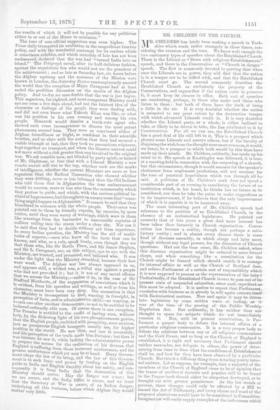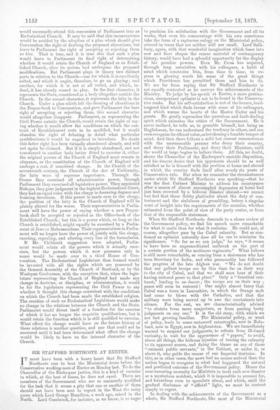MR. CHILDERS ON THE CHURCH.
R • CIi ILDE Rehas lately a
echinYorkMshirewhichreadsraterstrangelyinthesetimes con-
sidering the occasion and the man. We know well enough the two customary types of speeches about the Established Church. There is the Liberal or "Down with religious Establishments" speech, and there is the Conservative or "Church in danger" speech. The first is commonly devoted to proving that when once the Liberals are in power, they will find that the nation is in a temper not to be trifled with, and that the Established Church must go. The second commonly describes the Established Church as exclusively the property of the Conservatives, and argues that if the nation cares to preserve it, it must keep its owners in office. Both sort of speeches are comforting, perhaps, to those who make and those who listen to them ; but both of them have the fault of being a little in the air. It is very doubtful whether the nation is animated to any great extent by the destructive temper with which advanced Liberals credit it. It is very doubtful whether the Liberal party, as a whole, is either inclined to take, or likely to be driven to take, the line attributed to it by Conservatives. For all we can see, the Established Church has a good deal of life still left in it. This is a prospect which pleases some Liberals and annoys others, but if the faculty of disjoining the wish from the thought were more common, it would, we fancy, be a prospect to which both would by this time have made up their minds. Mr. Childers, evidently, has made up his mind to it. His speech at Knottingley was delivered, it is true, at a meeting held in connection with the reopening of a church. but this circumstance, though it would account for the speaker's abstinence from unpleasant predictions, will not account for the tone of practical hopefulness which ran through all he said. A politician of Mr. Childers's rank does not spend a considerable part of an evening in considering the future of an institution which, in -his heart, he thinks has no future to be considered, nor does he take the pains to make suggestions as to its improvement, if he believes that the only improvement of which it is capable is to be improved away.
The most interesting part of Mr. Childers's speech had reference to the position of an Established Church, in the absence of an ecclesiastical legislature. He pointed out correctly that of late years a great deal more interest has been taken than formerly in Church organisation. Convo- cation has become a reality, though not perhaps a satia- factory reality ; and in almost every diocese there is some kind of diocesan assembly, in which clergy and laity meet, though without any legal powers, for the discussion of Church questions. Had not the time come, Mr. Childers asked, when this diocesan organisation might be reduced to more formal shape, and when something like a constitution for the Church might be framed which should enable it to manage its internal affairs as well as the Church of Scotland does. and relieve. Parliament of a certain sort of responsibility which it is now supposed to possess as the representative of the' laity Undoubtedly, if the Established Church is ever to pass out of its present state of suspended animation, some such expedient:as- this must be adopted. It is useless to expect that Parliament, overladen with business-as it already is, will again concern itself • with Ecclesiastical matters. Now and again it may be driven into legislation by some sudden wave of feeling, as it was at the time of the passing of the Public Worship Regulation Act. But ordinarily, it has neither time nor thought to spare for subjects which do not immediately
concern it. Nor, with its present constitution, is Par- liament a proper body to debate the internal affairs of a particular religious communion. It is a very proper body to debate the relations between any or all religious communions and the Civil Power, and so long as the Church of England is established, it is right and necessary that Parliament should neither surrender, nor delegate to others, the power of deter- mining from time to time what the conditionsof-Establishment shall be, and how far they have been observed by a particular Church. But this is a different thing from debating purely inter- nal matters. Let us suppose, for example, that a 'majority of the members of the Church of England came to be of opinion that the traces of media3val doctrine and practice still to be found in the Prayer-book should either bo altogether destroyed, or be brought out with greater prominence. As the law stands at present, these changes could only be effected by a Bill to amend the Act of Uniformity, and every clause and word of the proposed alterations would have to be considered in Committee. Imagination will easily supply examples of the indecorum which would necessarily attend this conversion of Parliament into an Ecclesiastical Council. It may be said that this inconvenience would be avoided by the adoption of a plan which should give Convocation the right of drafting the proposed alterations, but leave to Parliament the right of accepting or rejecting them en bloc. That is true, and it is true also that such a plan would leave to Parliament its final right of determining whether it would retain the Cluirch of England as an Estab- lished Church, after its system had undergone the proposed modifications. But Parliament plays in theory two distinct parts in relation to the Church—one for which it is excellently suited, and which it ought, therefore, to go on playing ; and another, for which it is not at all suited, and which, in- deed, it has already ceased to play. In the first character, it represents the State, considered as a body altogether outside the Church. In the second character, it represents the laity in the Church. Under a plan which left the framing of alterations in the Prayer-book to Convocation, and gave Parliament the bare right of accepting or rejecting them, this second character would altogether disappear. Parliament, as representing the Civil Power outside the Chureh,would retain the right of say- ing whether it would allow the conditions on which the con- tract of Establishment rests to be modified, but it would abandon the right of debating in detail what particular modifications it would be expedient to introduce, No doubt this latter right has been virtually abandoned already, and will not again be claimed. But if it is simply abandoned, and not transferred to another body better fitted to exercise it, either the original powers of the Church of England must remain in abeyance, or the constitution of the Church of England will undergo a real, if unnoticed change. In the Church of the seventeenth century, the Church of the Act of Uniformity, the laity were of supreme importance. Through the Crown they exercised all administrative power, through Parliament they exercised all legislative power. They appointed Bishops, they gave judgment in the highest Ecclesiastical Court, they had an equal voice with the clergy in decreeing dogmas and framing devotions. If this power is made over to the clergy, the position of the laity in the Church of England will be plainly altered for the worse. Their representatives in Parlia- ment will have the power of saying whether a new Prayer- book shall be accepted or rejected as the Office-book of the Established Church; but this is a power which, so long as the Church is established, might equally be exercised by a Parlia- ment of Jews or Mahommedans. Their representatives in Parlia- ment will no longer have the power of, jointly with the clergy, enacting, repealing, and altering every line of the formularies.
If Mr. Childers's suggestion were adopted, Parlia- ment would retain all the powers which it actually exer- cises, but the powers which it now possesses only in name would be made over to a third House of Con- vocation. The Ecclesiastical Legislature thus formed would be invested with all the rights which are possessed by the General Assembly of the Church of Scotland, or by the Wesleyan Conference, with the exception that, when the legis- lature representing the Church of England had made any change in doctrine, or discipline, or administration, it would be for the legislature representing the Civil Power to say whether it thought this change consistent with the conditions on which the Church had been made the established religion. The creation of such an Ecclesiastical Legislature would make no change in the relations between the Church and the State. Parliament would divest itself of a function for the exercise of which it has no longer the requisite qualifications, but it would retain the function which it is still qualified to exercise. What effect the change would have on the future history of these relations is another question, and one that could not be answered until it had been determined what effect the change would be likely to have on the internal character of the Church.



































 Previous page
Previous page